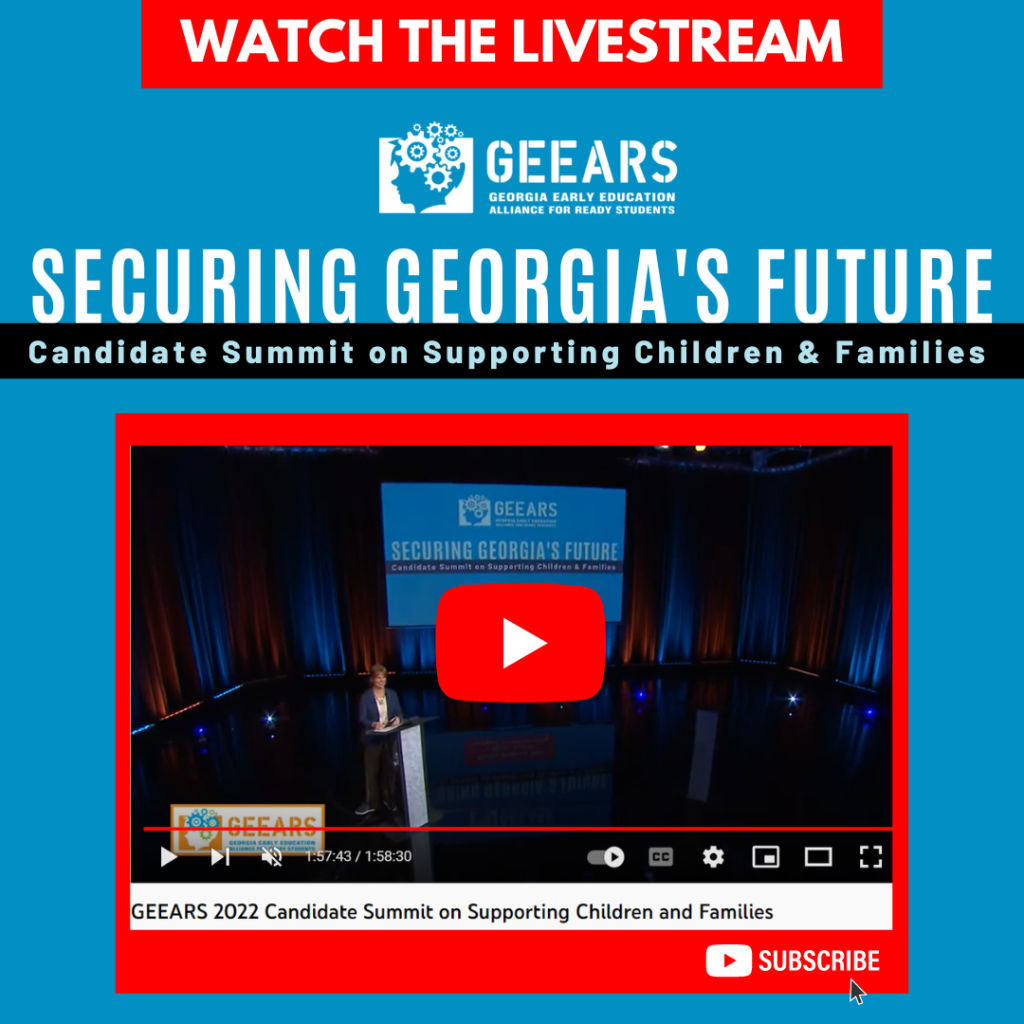Where Georgia Candidates and Surveyed Voters Stand on Early Childhood Issues

By GEEARS for Saporta Report
At the GEEARS Candidate Summit on Supporting Children and Families on October 3rd, several of Georgia’s candidates for statewide office spoke directly to voters, particularly those of us who vote with a keen eye on the issues that affect Georgians ages five and under.
The two-hour program at Georgia Public Broadcasting was a substantive and meaningful discussion about how, together, we can create a Georgia where all children thrive. The evening’s highlights included:
- Dr. Jack Shonkoff‘s keynote sharing some of his latest research and the implications it can have on future policy in Georgia.
“The time is ripe for a mindset shift in early policy,” Dr. Shonkoff told us, explaining that new discoveries in his field have led to the term “Early Childhood Development 2.0,” in which we understand that early experiences affect not just a child’s brain, but “the rest of the body in a broader ecosystem.” This new mindset, Dr. Shonkoff said, demands a bold, new early childhood agenda that acknowledges the striking inequality and uncertainty of today’s world.
- Interviews with Gubernatorial candidate Stacey Abrams, State School Superintendent candidates Richard Woods and Alisha Thomas Searcy, and U.S. Senate candidate, Reverend Raphael Warnock. (While Governor Brian Kemp and U.S. Senate candidate, Herschel Walker, were invited to the summit, they were unfortunately unavailable and did not attend.) Even an impromptu—and fascinating—chat between GEEARS’ board chair, Stephanie Blank, and our Executive Director, Mindy Binderman!
Many of the questions posed to the candidates were submitted by members of the GEEARS community. We also heard the opinions of Georgians when Rob Schmidt, GEEARS’ pollster with McLaughlin & Associates, presented the results of our recent poll of 600 likely voters from across the state. The poll confirmed that most Georgians, no matter their party affiliation, care about young children, their families, and the professionals who educate and care for them.
“These issues aren’t Republican. They’re not Democrat,” Rob said in his presentation. “They really operate outside of these polarized political boundaries here.”
Here are some takeaways from the poll results:
On the importance of children’s social-emotional health and development
More than nine in ten (93%) of Georgia’s likely voters agree that children’s social-emotional development during their early years is important to their later school success.
On access to high-quality child care
Nearly eight in ten (78%) of Georgia’s likely voters agree that expanding access to high-quality child care gives parents the opportunity to participate in the workforce, which is good for Georgia’s economy.
Almost half (49%) say finding quality, affordable child care in their area is a problem, including 21% who say it’s a “very serious” problem.
On paid leave for parents
83% of Georgia’s likely voters support providing paid family or medical leave to care for themselves or a family member with an illness, while only 15% oppose. Large majorities of all key voter groups support this.
Eight in ten (80%) of Georgia’s likely voters support providing paid parental leave for the birth or adoption of a child, while only 18% oppose. There is broad support among Georgia voters.
On Georgia’s Pre-K
Almost nine in ten (88%) of Georgia’s likely voters support Georgia’s free, lottery-funded voluntary Pre-K. Support has been consistently high for Georgia’s Pre-K going back to 2010.
On mental health services for children and families
87% of Georgia’s likely voters put an emphasis on improving access to mental health services for children and families and nearly seven in ten (68%) would be more likely to vote for a candidate for political office who supports policies that give families and young children better access to mental health services. This response increases to 84% among voters with a household income under $50,000.
On just compensation for early educators
Greater than three in four (77%) of Georgia’s likely voters agree that people who work in child care and early education should be paid a salary comparable to elementary school teachers if they have the same credentials and experience. Decisive majorities of Democrats (88%), Republicans (67%), and Independents (77%) agree.
Eighty-three percent (83%) of Georgia’s likely voters support increasing the salaries of qualified child care and preschool teachers in Georgia to attract more individuals to this field. Only 13% oppose this.
On financing health and education services for young children
Seven in ten (71%) of Georgia’s likely voters support using a portion of Georgia’s historic budget surplus to expand the state’s budget for early childhood education and child health programs.
In addition to our Candidate Summit (which you can view here) and Likely Voters Poll, GEEARS has created a non-partisan, interactive voter guide to empower Georgians to make informed decisions at the polls. Please share these resources with every Georgia voter you know— families, colleagues, neighbors, friends, and more. Encourage them to make a plan to participate in this year’s election.
Our votes impact our children’s futures. On November 8th, we have the opportunity to make our voices heard.
Watch the replay: